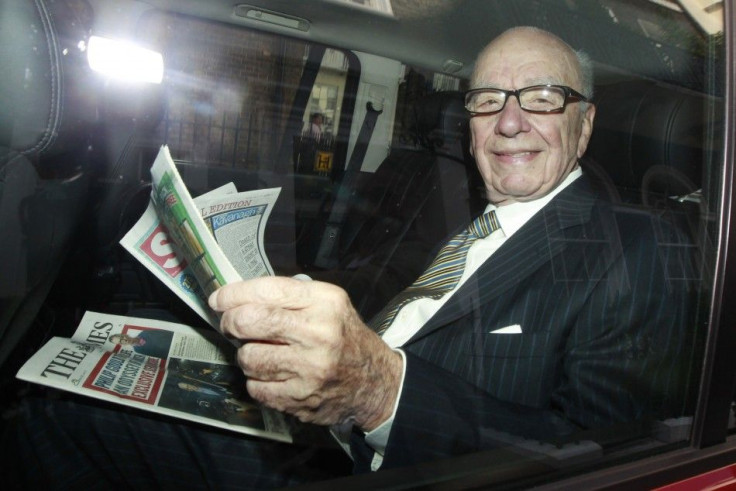Rupert Murdoch's News Corp. Media Empire Now at Risk?
COLUMN: UK Phone-hacking scandal creates News Corp. domino effect

Most every dog has its day, eventually. Rupert Murdoch was flirting with fate, though -- thriving for the most part until the age of 80 as a global media mogul on his own terms, acquiring a mix of far-flung, far-reaching mix of media properties ranging from a tabloid like the News of the World to a respected newspaper like The Wall Street Journal.
News Corp. (NYSE: NWS) has befuddled for the longest time many American news traditionalists who thought he would surely fall. But for the longest time, Murdoch proved them wrong. In the Great Recession, as most newspapers throughout America watched circulation numbers fall as fast as Greece's debt rating, the Wall Street Journal defied all odds, actually growing circulation. Not only that, as most other newspapers gnashed over the decision to charge for online content, the Journal was steadily collecting fees from a paid-content structure already in place.
Many of those working for Murdoch in management positions close enough to receive the touch of his pressure -- constantly applied by an outreached hand pushing them to push product to the bleeding edge to keep profits at the multimedia company rolling -- say its been a bittersweet ride. They have benefited from growth and sustainability while peers found themselves out of work, but they have also suffered from pressure to get it done, whatever that meant.
Murdoch is a pirate, wrote author Ken Auletta in a 1995 profile of Murdoch. He will cunningly circumvent rules, and sometimes principles, to get his way.
Of courage and fear
The result has been a leader who hasn't been loved by any stretch of imagination but he has been respected, with a large, overriding dose of fear.
Wall Street gave Murdoch's News Corp. the same kind of respect, often valuing the media company's stock higher than stocks of its media competitors. Murdoch's global reach, drive and properties scope yielded advantage -- until now.
Many observers thought, if not hoped, Murdoch would eventually stumble, if only because of his broad and diverse exposure and style. The odds seemed strong, too, that one domino might fall somewhere along the way, cascading throughout his media empire. And now, we're seeing just that -- the first domino falling with the News of the World hacking scandal, and others like the company's stock price falling in the aftermath.
It could have stopped with the closing of the News of the World, had Murdoch played it all right. But oddly, he reacted in a way that hinted there's something to hide, making people look deeper and harder because it seems he's trying to make the world watch a different moving hand than the one it wants to follow.
Instead of taking his media company out of the news, by quietly sitting still, he closed the News of the World in haste, and continues aggressively pursuing News Corp.'s purchase of BSkyB despite pressure from government officials to back off from the controversy.
Murdoch's relentlessness to seize full control of BSkyB is keeping his company and controversy at center stage, particularly in the UK -- resulting in that domino effect. Developments suggest News Corp. is taking steps to delay its proposed takeover of BSkyB, in hopes of waiting out the phone-hacking furor that has engulfed the company, but it hasn't backed away yet. And it doesn't appear News Corp. is going entirely away.
The only possible thing that could get Murdoch's attention, thus, backing him off completely, is the market's response the media controversy. News Corp. has lost $7 billion in market value over the past four trading days, dropping 7.6 percent to $15.48 on the NASDAQ Monday while the Murdoch furor burned as one of the hottest stories on the global Internet.
One analyst says News Corp.'s flagging stock price is implying News Corp. is going to have to get out of the UK.
At the moment, that seems apparent as the country accustomed to tabloid scandal and news has become embroiled, if not outraged by the seedy facts and rumor regarding hacking, death and cover-up that are fast emerging in the Rupert Murdoch furor. The big question now seems only to be: How far-reaching will the scandal be, beyond the UK?
In other words: Will the falling domino effect ripple to the U.S., throttling through News Corp.'s powerhouse properties, Fox TV network, and the respected Wall Street Journal?
Already News Corp. may face legal troubles in the U.S. related to the phone-hacking charges, as Amalgamated Bank of New York has filed an amended complaint against the company made public Monday. These revelations should not have taken years to uncover and stop, the bank said in its amended lawsuit filing. These revelations show a culture run amok within News Corp. and a board that provides no effective review or oversight.
That allegation will come as a surprise to few, particularly those from inside Murdoch's empire who've worked hard to carry out the mogul's mission over the years. The know the Murdoch way, well -- get it done.
Whatever it takes.
At the moment, that style is coming back to haunt Rupert Murdoch and News Corp.
© Copyright IBTimes 2024. All rights reserved.











